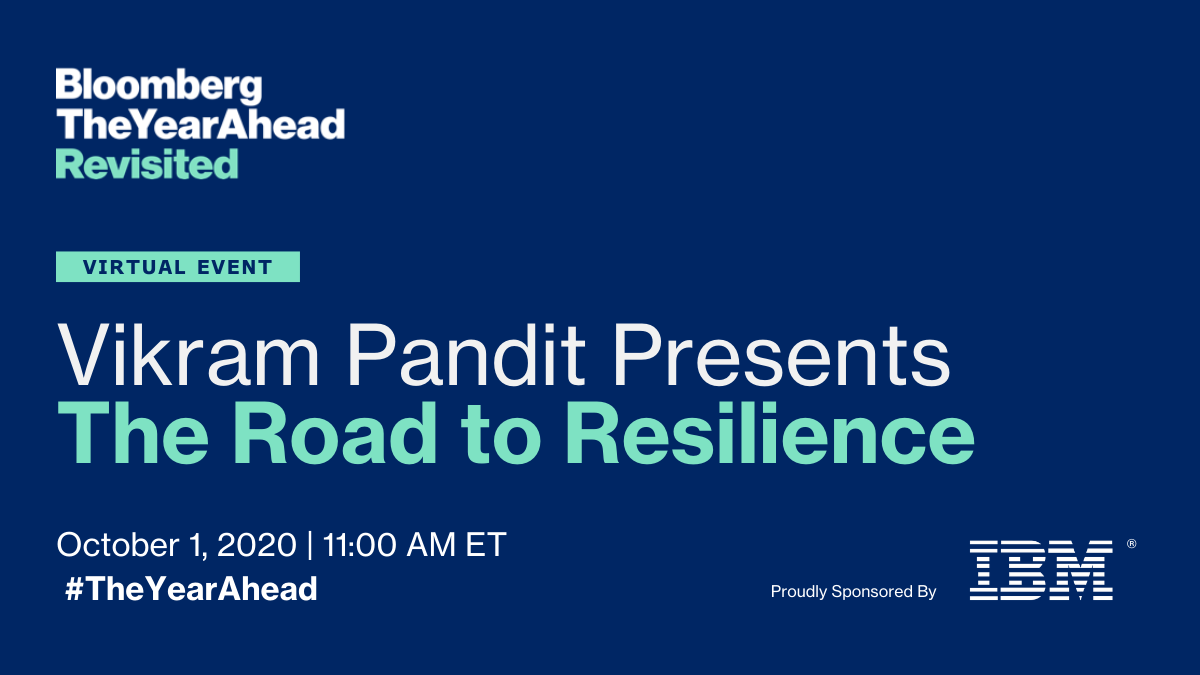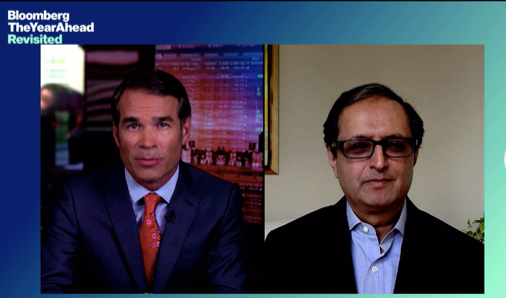
Key Takeaways
The Year Ahead Revisited
By Nicole Sawyer, Bloomberg Live Senior Editor
October 1, 2020
Covid-19 has wreaked havoc on the global economy and companies have had to adjust — in most cases, overnight. The world watched as wild swings on Wall Street sent stocks and retirement investments plunging. At Bloomberg’s virtual event, The Year Ahead Revisited: Vikram Pandit Presents The Road to Resilience, Bloomberg’s Editor-at-Large Erik Schatzker sat down with Vikram Pandit, best known as the former CEO of Citigroup and current Chairman and CEO of the Orogen Group, to discuss how the global pandemic has changed the face of the financial industry forever. Which changes will be permanent and which ones won’t? What will banking look like as legacy companies modernize physical-based business models and embrace the digital future of finance?
Speaker:
Vikram Pandit, Orogen Group Chairman and CEO
Click here to view video of the full discussion.
A few of the key takeaways:
The aftermath of Covid-19: How will Wall Street adapt?
Vikram Pandit, Orogen Group Chairman, and CEO, discussed how the pandemic is transforming Wall Street’s mindset and guiding central bank regulators and financial leaders toward a new way of thinking. What does it take to modernize business models and run a company with business continuity? Will the trading floor adopt a hybrid approach when it comes to working remotely?
“We’ve focused so hard on efficiency. How do we think about resilience? And the resilience to some extent does somehow use digitization as a concept. It’s about data structures. Having enough information, having analytics, artificial intelligence. It’s about connectivity, making sure your customers are connected correctly. It’s about making sure you think about your engineering correctly. The cloud, etc.,” he said.
Pandit also talked about the benefits of people’s ability to work from home. “It’s an opportunity not only because they can work from home, but imagine how it opens up access to a talent base of 7.5 billion people. You can use them around the world,” he said.
In response, Erik Schatzker, Bloomberg’s Editor-at-Large, pointed out how J.P. Morgan and Goldman Sachs are among the financial firms trying to repopulate their buildings and they are facing criticism for ordering traders back to the office. He asked Pandit if this was a mistake and does the digital future of finance include a decentralized trading floor?
Pandit responded that he has been working more productively from home than when he was in the office, but it’s a complicated issue and really comes down to the “nature of the business and the nature of the task at hand.
“The fact is that when I was on a trading floor. That was a different time. It was a different system. And one of the benefits of proximity is you get to know people, you build cultures, and it’s on the basis of that that you can work from home. But the reality is a lot of the tasks that you needed to do at the office you can do from home. You can tap into a 7.5-billion-person talent base. You can work using gig economies,” Pandit explained.
“I think the digital future of finance encompasses what I call digitally native approaches to finance. On one extreme you have decentralized finance where forget about trading floors, you’re trading things and conducting transactions with very few intermediaries involved. And, on the other hand, I think you have technologically adept trading algorithms and other approaches. My sense on this is we’re going to find an approach that encompasses both of those capabilities in place. I don’t think this is about one or the other,” Pandit said.

Why is Wall Street so resistant to change?
Pandit said Wall Street’s resistance to change stems from being a victim of their success. “We’re so good at the 20th-century banking architecture. That is always hard to change a paradigm. But look, the pandemic has forced all of us. Even I have this app now where you take a check and take a picture and send it. And the money gets deposited in a bank. But it raises the obvious question: Why did you have checks? Why did I have to take pictures? Yes, you’ve digitized what is a physical aspect of banking, but isn’t there a different way? And we don’t need to reinvent it. We just need to watch around the world as to what is happening. And, frankly, there are better ways of doing that,” he said.
Pandit raised the idea of a digital currency that’s issued by the state fiat currency.
“I don’t mean cryptocurrency. I’m talking about physical currencies. And, my God, doesn’t that really change the paradigm of banking? Those are the kind of questions that governments around the world and regulators are asking. It’s high time for us to get to the forefront of that debate.” he said.
The stakes are high: In a global competition, could the U.S lose as a leader?
Schatzker asked Pandit, “What’s at stake if the U.S. financial establishment and the U.S. regulatory establishment — the Federal Reserve, the Treasury Department, the Office of the Comptroller of the Currency — if it doesn’t embrace progress and the transition to a digitally native financial future?”
“We happen to be in an enviable position as a country, with a very strong financial system where we set our own rules in the 20th century. The rest of the world followed them. We have a wonderful reserve currency that serves the world and serves us well. As you look forward. I would like to be the one setting the rules. I’d like to be the one setting the standards. I’d like to be the one that the rest of the world looks at and says, ‘that’s really interesting, let’s follow that lead.’ And I’d like to be the one that preserves the primary nature of the U,S. dollar as the global reserve currency.
“Now don’t get me wrong, I don’t think we are under any imminent threat in any near-term issues. But these things don’t work that way. If standards for banking money exchange digitally native financial system[C1] get set up and set elsewhere and we have to follow them — that does put us in a place that we shouldn’t want to be. I really think it’s an opportunity for leadership for the U.S. regulatory community and the Federal Reserve to step up and see how we can get to this digitally native future of the 21st-century financial architecture,” he added.
Banking on big tech
Pandit addressed the issue: Would it help or hurt for big tech giants to be able to participate more directly in our financial system. “If you do go to a digital currency and if you do go to digital wallets, somebody has to house them. Somebody has to link them. Somebody has to keep them safe. And there’s no reason to believe that’s only banks. Any firm that follows the regulations and the rules that are required for safety soundness — which are all part of what we must have in a financial system — can participate in that because it’s not about lending. It’s about payments, about connecting to the system. It’s about making sure that you have an identity. It’s about making sure you’re included in the economy. There is no reason it has to be a bank. It could be a technology company,” he said.
U.S. Federal stimulus, an end in sight?
To rescue the beaten-down economy from the pandemic’s wrath, the Federal Reserve cut rates to near zero and President Donald Trump stepped in with the largest stimulus package in history, $2.3 trillion, but when will it end?
“The real value comes from growing economies. You need earnings to grow. You need businesses to grow. You need people to consume,” said Pandit. “And having low interest rates somehow indicates there is not demand for investment capital. What is that saying about growth? So, to me, yes, the Federal Reserve and the government had to do what they had to do in a crisis, but, on a longer-term basis, we need to reignite growth. We need to get that demand for investment up. We need to get demand for loans going up. That should be our objective. And part of that, I think, can be unleashed by embracing the digital future we have in finance,” he said.
The Year Ahead Revisited was Proudly Sponsored By

——————————
Join the Conversation: #TheYearAhead
Instagram: @BloombergLive
LinkedIn: Bloomberg Live
Twitter: @BloombergLive
Interested in more Bloomberg Live virtual events? Sign up here to get alerts.
——————————